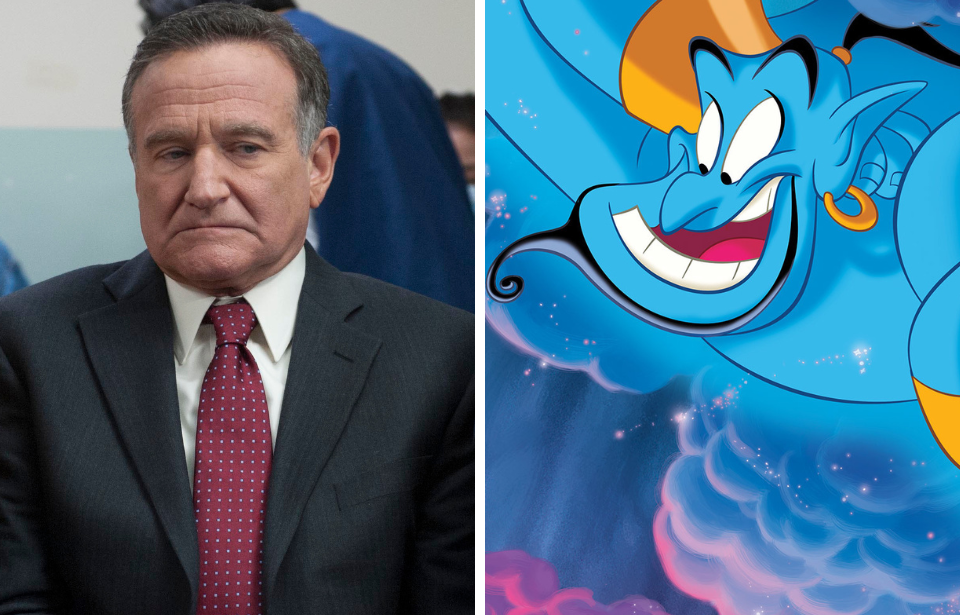Robin Williams as the voice of Genie in Aladdin (1992) is nothing less than iconic. When the live-action remake was released in 2019, people were nervous that Will Smith’s version wouldn’t live up to the greatness of his predecessor. It comes as no surprise that no one will ever be able to do it like Williams, so Smith made the part entirely his own.
Back when the 1992 film was first released, Williams and Disney had a falling out that caused him to step away from the role, even refusing to come back for the sequel. Nothing would shake him until Disney apologized, and it took them a pretty long time to do so.
Robin Williams was the perfect Genie
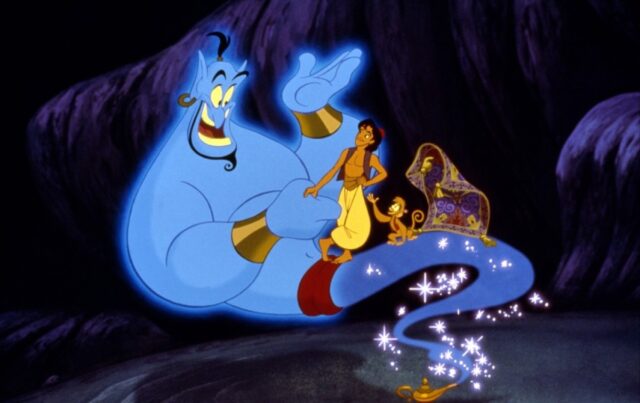
Before Robin Williams accepted the role of Genie, the character was intended to be a much smaller part than it became; after the actor joined, it became clear to the writers that the role needed to be much bigger than originally planned. As soon as he entered the voice recording booth, Williams’ wit and humor took him off-script, and he ended up providing the producers with nearly 30 hours’ worth of dialogue as Genie.
The co-director of Aladdin, Ron Clements, said, “Each take, Robin would add and embellish, so by the 25th (and last) take, the scene had expanded (from three minutes) to about 20 minutes long! Robin kept coming up with more and more ideas. And he was consistently hilarious. At one point, we had to remove the Genie’s lead animator, Eric Goldberg, from the recording stage because his uncontrollable laughter was messing up takes.”
We imagine that with that much content to choose from, it must’ve been hard to decide what made it into the film and what didn’t. Clements shared this sentiment, saying, “Hopefully we picked the best stuff, but there was a tremendous amount of strong material that didn’t make it.”
Disney made the wrong move
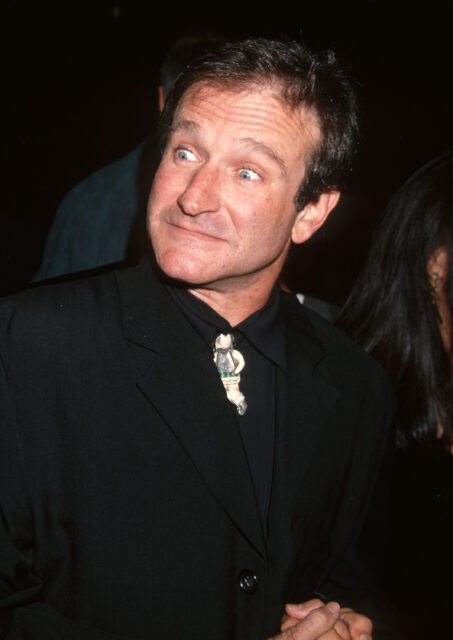
When it was completed, Aladdin was an absolute smash with audiences, leading Disney to capitalize on profits by merchandising the film’s characters. However, the way they did this caused a serious rift with Williams, as they went against his original contract.
In 1993, Williams appeared on The Today Show to promote his newest film, Mrs. Doubtfire, when he explained exactly why Disney was no longer in his good books. As it turns out, before joining Aladdin, he’d set out a strict stipulation that his voice not to be used for merchandising. He even accepted a lower-paying contract in exchange for this. Unfortunately, Disney went ahead with using his voice anyway.
“Then all of a sudden, they release an advertisement – one part was the movie, the second part was where they used the movie to sell stuff,” Williams explained. “Not only did they use my voice, they took a character I did and overdubbed it to sell stuff. That was the one thing I said: ‘I don’t do that.’ That was the one thing where they crossed the line.”
Williams said there was no way he was going to work with Disney again unless they apologized for going against their word. However, the company’s rebuttal was that Williams’ comments came from a place of unhappiness, due to his smaller paycheck. “Every single piece of marketing material involving Robin Williams was run by Marsha (the actor’s wife) and Robin Williams,” a Disney source assured the public.
A Picasso didn’t mend the situation
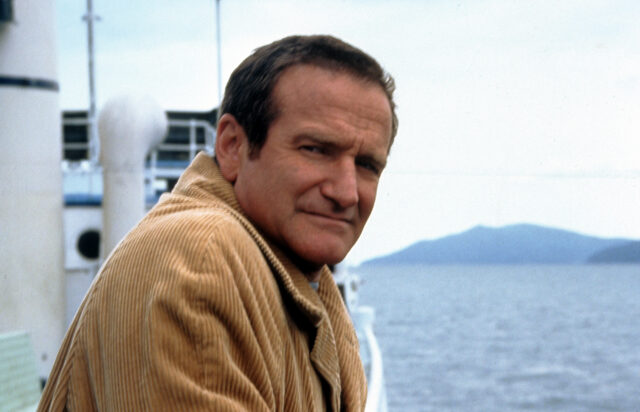
Whether that was true or not, Williams kept his word and refused to work with Disney, even when the sequel, Aladdin: The Return of Jafar (1994), and the television version, Aladdin: The Series (1994-95), were underway. With how loveable Genie was the first time around, it was only natural that the role would be a big part in the rest of the franchise. However, Williams wasn’t willing to return without an apology.
Apparently, Disney wasn’t ready to give him one. They cast Dan Castellaneta, who voices other cartoon characters (most notably Homer Simpson), to replace Williams. While Castellaneta did his best to emulate Williams’ voice, the change in actors was pretty obvious. Perhaps realizing that replacing Williams would be a difficult task, the chairman of Disney, Jeffrey Katzenberg, tried to mend things over by gifting the actor a Picasso painting valued at $1 million.
Williams couldn’t be bought back, though, and the painting hung in his living room as a reminder of the lack of acknowledgement by Disney in what they did wrong.
Disney’s chairman finally issued an apology
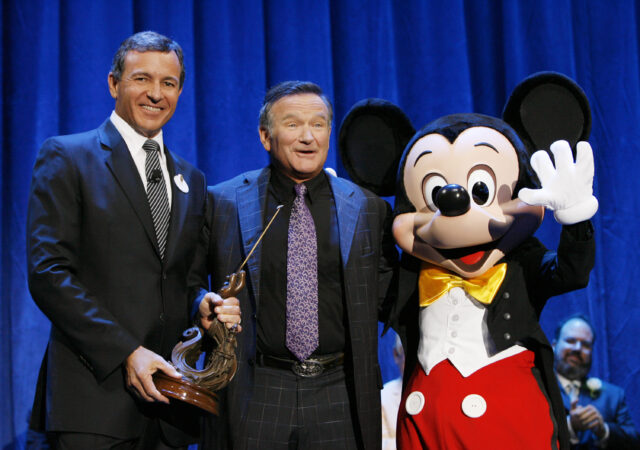
Things wouldn’t get better until 1994, when Katzenberg was replaced by Joe Roth as Disney’s chairman. Finally, after years of feuding, Roth gave the public apology Williams was looking for. The actor quickly accepted and signed on to rejoin the Aladdin franchise as Genie for its final film instalment, Aladdin and the King of Thieves (1996).
Clements explained, “Robin changed the way animated films were perceived. His brilliant comedy brought an adult appeal to animation that was new at the time. He was also one of the biggest stars ever to be featured in an animated film at that time.
“To be clear, we didn’t want Robin because he was a big star,” he continued. “We wanted him because he was right for the part. We wanted him because we thought his talents could bring something new and innovative to Disney animated features that could be exciting and entertaining. And he sure did!”
In 2009, any remaining animosity between Williams and Disney was officially squashed, as he was inducted as a Disney Legend at the D23 Expo.
More from us: Dave Coulier Crashed On Bob Saget’s Couch Years Before ‘Full House’
Following Disney’s official apology, Williams went on to star in more than just the Aladdin franchise, working with the company on other projects, like Flubber (1997) and Happy Feet (2006).
